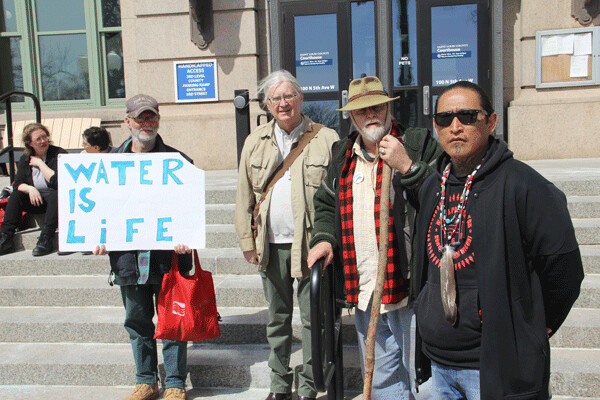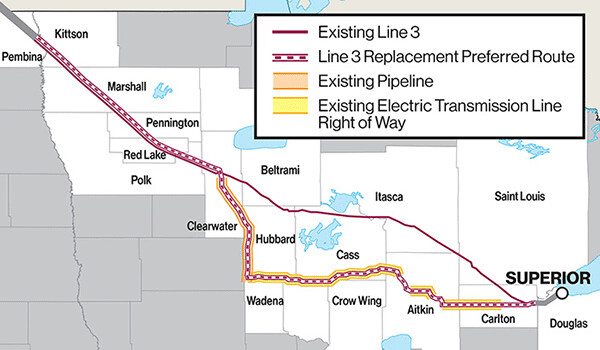News & Articles
Browse all content by date.


It was just a short pretrial hearing, but people packed a St. Louis County courtroom April 20 in support of three men charged with trespassing at Wells Fargo Bank in downtown Duluth earlier this year. Judge Dale Harris consolidated the three cases and set the next hearing for May 30.
Scott Bol, Michael Niemi and Ernesto Burbank blocked the entrance to protest investments in fossil fuels on January 12. The focus was Wells Fargo’s relationship with Enbridge, whose pipelines transport oil through Minnesota.
Burbank and Niemi used chains and pipes to lock themselves in front of the bank doors while Bol put a U-shaped bicycle lock around his neck so the gate couldn’t be raised without choking him. Firefighters cut the locks loose.
Prior to last Friday’s hearing, demonstrators held a prayer by Lake Superior, then gathered outside the courthouse. Burbank pointed to the words written across the top of the building. “It says ‘public safety,’” he said. “Why do the courts protect banks that bring harm to the public? They’re washing each other’s hands.”
The three have been charged with misdemeanor trespassing, disorderly conduct and obstructing the legal process. They have pleaded not guilty and asked for a jury trial. “More democratic to speak to the people,” Bol said.
He notes, though, that when he was convicted for trespassing in a 2015 protest at the Enbridge office in Duluth, the prosecution reduced the charges to petty misdemeanor, so there was just a trial before a judge instead of a jury.
The defendants plan to use the “necessity defense,” that their actions were necessary to prevent greater harm. This defense is being used increasingly in civil disobedience cases on climate action. So far it’s only worked once, in England in 2008.
It is “a novel legal tool that hasn’t yet succeeded in any court in the United States,” according to the website climatedisobedience.org. “As soon as the first activist manages to successfully use the necessity defense at trial, it will become a powerful precedent for future defendants to justify their moral lawbreaking.”
In a 2013 case in Massachusetts, activists used a boat to block coal shipments to a power plant. They prepared a necessity defense, but on the morning of the trial, the prosecutor dropped all charges and said their actions were justified.
Four people who turned off emergency shutoff valves on Enbridge pipelines near Bemidji in October 2106 plan to use the necessity defense. On April 23 of this year, the Minnesota Court of Appeals ruled the defense could be used in their upcoming trial.
Another major state court opinion affected Enbridge pipelines on April 23. Enbridge proposes to replace its aging Line 3, which runs from Alberta, Canada through northern Minnesota to Superior, Wis. The company wants to run a new route from Park Rapids to East Carlton County.
After three years of study, hearings and testimony from pipeline supporters and opponents, Administrative Law Judge Ann O’Reilly issued an opinion Monday to the state Public Utilities Commission (PUC). The full report may be found at at mn.gov/puc/line3.
O’Reilly agreed that “replacement of the line is a reasonable and prudent action.” But she did not support a new route. “That would mean nearly 300 miles of steel infrastructure being abandoned in Minnesota, where it will remain for hundreds, if not thousands, of years,” she wrote.
She recommended using Line 3’s existing route, which goes through the Leech Lake and Fond du Lac Native American reservations. The federal government has easements allowing it to run six pipelines through the reservations. But the easements expire in 2029 and would have to be renegotiated before then. Without assurance that a settlement could be reached, it would be pointless to build new lines because they may well have to be removed within a decade.
The Leech Lake Band released a statement calling “horrific” the recommendation to run the new pipeline through the reservation. The band had already told Enbridge in 2012 to find another route.
The judge essentially recommended the new pipeline not be built at all, said Andy Pearson of the environmental group MN350. “She created an impossible scenario, saying it has to go through reservations where we know the tribes are opposed,” he said.
The judge’s recommendation is nonbinding, so whether the PUC goes along with it won’t be revealed until the commission makes its final determination, on the expected date of June 21.
“The judge’s report is somewhat confusing,” Pearson said. “My hope is (the PUC) will sort that out and see the need isn’t justified.”
Enbridge released a statement saying, “Our preferred route was selected for several reasons, including respecting the sovereignty of the Tribal communities through which the pipeline corridor currently passes. Further, the Final Environmental Impact Statement approved by the MPUC demonstrates that on balance, our preferred route is least impactful on tribal/cultural resources, proximity to drinking water and high consequence population areas.” Enbridge’s stock dropped by nearly five percent after the judge’s opinion was released.
The Environmental Impact Statement calculated the pipeline’s “social cost of carbon” as $287 billion over 30 years.
Sticking to the current route and removing the old pipe would also raise the project’s price tag by nearly $1.3 billion. Minnesotans for Pipeline Cleanup, a citizens and landowners group, refers to that cost as “a potential investment in our communities” and estimates, based on Enbridge’s data, that removal would create 8,290 jobs.
| Tweet |


